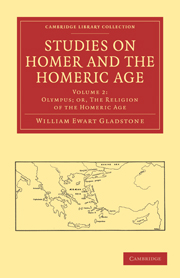Book contents
- Frontmatter
- Contents
- OLYMPUS: OR THE RELIGION OF THE HOMERIC AGE
- SECT. I On the mixed character of the Supernatural System, or Theo-mythology of Homer
- SECT. II The traditive element of the Homeric Theo-mythology
- SECT. III The inventive element of the Homeric Theo-mythology
- SECT. IV The Composition of the Olympian Court; and the classification of the whole supernatural order in Homer
- SECT. V The Olympian Community and its Members considered in themselves
- SECT. VI The Olympian Community and its Members considered in their influence on human society and conduct
- SECT. VII On the traces of an origin abroad for the Olympian Religion
- SECT. VIII The Morals of the Homeric Age
- SECT. IX Woman in the heroic age
SECT. III - The inventive element of the Homeric Theo-mythology
Published online by Cambridge University Press: 05 October 2010
- Frontmatter
- Contents
- OLYMPUS: OR THE RELIGION OF THE HOMERIC AGE
- SECT. I On the mixed character of the Supernatural System, or Theo-mythology of Homer
- SECT. II The traditive element of the Homeric Theo-mythology
- SECT. III The inventive element of the Homeric Theo-mythology
- SECT. IV The Composition of the Olympian Court; and the classification of the whole supernatural order in Homer
- SECT. V The Olympian Community and its Members considered in themselves
- SECT. VI The Olympian Community and its Members considered in their influence on human society and conduct
- SECT. VII On the traces of an origin abroad for the Olympian Religion
- SECT. VIII The Morals of the Homeric Age
- SECT. IX Woman in the heroic age
Summary
I come now to that mass of Homeric deities, who are either wholly mythological, or so loaded with mythological features, that their traditive character is depressed, and of secondary importance.
Jupiter.
The character of Jupiter, which commonly occupies the first place in discussions of the Greek mythology, has been in some degree forestalled by our prior examination of the position of other figures in the system, which are both more interesting and more important, from their bearing more significant resemblances to and traces of the truth of Divine Revelation.
Nevertheless, this character will well repay attention, To be understood and appreciated, it must be viewed in a great variety of aspects. When so viewed, it will be found to range from the sublime down to the brutal, and almost even down to the ridiculous. Upon the whole, when we consider that the image which we thus bring before us was during so many ages, for such multitudes of the most remarkable portion of mankind, the chief representative of Godhead, it must leave a deep impression of pain and melancholy on the mind.
‘ If thou beest He ; but Oh! how fall'n, how changed!’
The Jupiter of Homer is to be regarded in these four distinct capacities:
1. As the depository of the principal remnants of monotheistic and providential ideas.
2. As the sovereign lord of meteorological phenomena.
3. As the head of the Olympian community.
4. As the receptacle and butt of the principal part of such earthly, sensual, and appetitive elements, as, at the time of Homer, anthropophuism had obtruded into the sphere of deity.
- Type
- Chapter
- Information
- Studies on Homer and the Homeric Age , pp. 173 - 270Publisher: Cambridge University PressPrint publication year: 2010First published in: 1858



